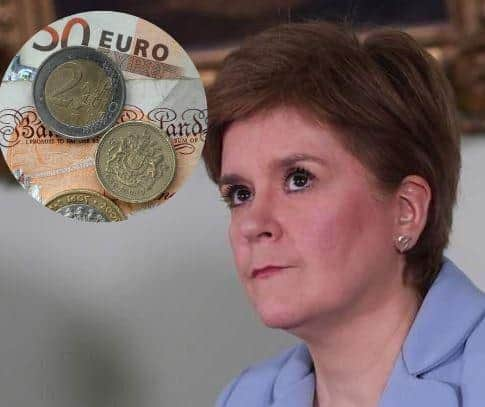What EU countries do not have the euro? Do EU countries have to join the euro zone?
Nicola Sturgeon has been accused of “desperate” arguments as she defied claims an independent Scotland would need to accept the Euro to join the European Union with Scottish Conservative leader leader Douglas Ross claiming that “Nicola Sturgeon’s plans for separation are in tatters” after he claimed an independent Scotland would need to sign up to the euro.
But is that the case?
A number of countries have joined the EU and not adopted the euro, with 19 of the 27 nations currently not in the eurozone. Here’s a list of those that currently have EU membership but have not signed up to the Euro currency.
Advertisement
Hide AdAdvertisement
Hide Ad

What European countries have EU membership but do not use the euro?
The countries currently in the EU but without membership of the single currency are:
Bulgaria Czech Republic Denmark Hungary Poland Romania Sweden
Croatia does not use the euro currently but will do so in 2023.
All EU member states are in principle obliged to introduce the euro once they fulfil the convergence criteria however, while many intend to join, some such as Sweden and Denmark have opted to keep their own currency. Sweden rejected the use of the euro in 2003 in a referendum while the Danish central bank’s sole mandate is to keep the crown currency stable against the euro, with the country having an “opt out” clause.
Seven of the 13 countries that have joined the EU since 2004 have switched to the euro
Who was the last country to join the euro and how do countries join?
Currently, the number of countries using the euro sits at 19 despite having 27 members. This will change in 2023 when Croatia adopts the euro after becoming an EU member in 2013. Croatia will adopt the currency from 1 January 2023, making Croatia the first nation to join the eurozone since Lithuania in 2015. In order to adopt the euro, a country has to fulfil a set of economic conditions including having a stable exchange rate and low inflation.
Do all EU countries need to join the euro?
On average, it takes just under five years from the opening of accession negotiations to becoming a full member state of the EU, however countries such as Finland and Sweden took less time - with Sweden still not using the euro.
Advertisement
Hide AdAdvertisement
Hide AdWhile there is an agreement in principle to join the euro as part of EU membership, countries such as Denmark have an opt out clause and others have not joined - either through choice or through failure to meet the criteria.
Since 1999 all new EU members are obliged to commit in principle to joining the euro once they meet certain criteria. It is also important to note that currently there is also no mechanism that actually forces a new EU member to adopt the currency.
Some countries, such as Poland, are theoretically in the process of joining the euro - but there is no fixed date about if and when they will join. Romania and other countries have said they intend to join the euro, but have pushed back dates for doing so.